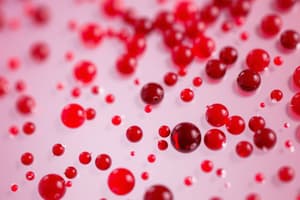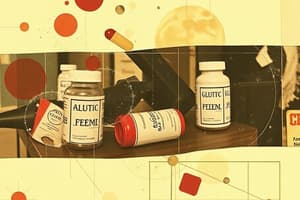Podcast
Questions and Answers
What is the main hazard associated with warfarin?
What is the main hazard associated with warfarin?
- Osteoporosis
- Reversible alopecia
- Haemorrhage (correct)
- Teratogenic effects
Which of the following is a contraindication for the use of warfarin?
Which of the following is a contraindication for the use of warfarin?
- Prosthetic heart valves
- Pregnancy (correct)
- Pulmonary embolism
- Atrial fibrillation
What is the mechanism of action of warfarin?
What is the mechanism of action of warfarin?
- It stimulates the production of clotting factors
- It directly inhibits thrombin formation
- It enhances the activity of plasminogen
- It competitively inhibits vitamin K epoxide reductase component 1 (correct)
What is the difference between heparin and low-molecular-weight heparins (LMWHs) in terms of thrombocytopenia?
What is the difference between heparin and low-molecular-weight heparins (LMWHs) in terms of thrombocytopenia?
What is the indication for using aspirin in patients with coronary artery disease?
What is the indication for using aspirin in patients with coronary artery disease?
What is the role of vitamin K in coagulation?
What is the role of vitamin K in coagulation?
Which of the following is a side effect of heparin?
Which of the following is a side effect of heparin?
What is the treatment for haemorrhage caused by warfarin?
What is the treatment for haemorrhage caused by warfarin?
Which of the following fibrinolytics is NOT 'clot selective'?
Which of the following fibrinolytics is NOT 'clot selective'?
What is the primary indication for the use of tissue plasminogen activator?
What is the primary indication for the use of tissue plasminogen activator?
What is the main side effect of fibrinolytic therapy that requires treatment with fresh plasma or coagulation factors?
What is the main side effect of fibrinolytic therapy that requires treatment with fresh plasma or coagulation factors?
Which of the following iron preparations is absorbed the least?
Which of the following iron preparations is absorbed the least?
What is the main advantage of hydroxocobalamin over cyanocobalamin?
What is the main advantage of hydroxocobalamin over cyanocobalamin?
In which of the following conditions is folic acid supplementation recommended?
In which of the following conditions is folic acid supplementation recommended?
What is the primary mechanism of action of fibrinolytic drugs?
What is the primary mechanism of action of fibrinolytic drugs?
Which of the following is NOT a indication for the use of fibrinolytic drugs?
Which of the following is NOT a indication for the use of fibrinolytic drugs?
What is the primary mechanism of action of heparin?
What is the primary mechanism of action of heparin?
What is the main difference between the action of heparin and low molecular weight heparin (LMWHs)?
What is the main difference between the action of heparin and low molecular weight heparin (LMWHs)?
What is the consequence of heparin binding to antithrombin III?
What is the consequence of heparin binding to antithrombin III?
What is the main hazard of heparin therapy?
What is the main hazard of heparin therapy?
What type of thrombi are anti-platelet drugs and fibrinolytic drugs primarily used to treat?
What type of thrombi are anti-platelet drugs and fibrinolytic drugs primarily used to treat?
What is the effect of heparin on the inhibition of clotting factors?
What is the effect of heparin on the inhibition of clotting factors?
What is the mechanism of action of antithrombin III?
What is the mechanism of action of antithrombin III?
What is the primary difference between the treatment of arterial thrombi and venous thrombi?
What is the primary difference between the treatment of arterial thrombi and venous thrombi?
Study Notes
Thrombosis and Anemia
- The main drugs used for platelet-rich arterial thrombi are antiplatelet drugs and fibrinolytic drugs.
- The main drugs used to prevent or treat venous thrombi are:
- Injectable anticoagulants (heparin)
- Oral anticoagulants (warfarin)
Mechanism of Action of Heparin
- Heparin binds to antithrombin III, leading to conformation changes and rapid interaction with protease (activated clotting factors).
- Once it binds and activates antithrombin, heparin is released intact for renewed binding to more antithrombin, leading to a continuous anticoagulant effect.
- Heparin accelerates the rate of neutralization of certain activated coagulation factors (XIIa, XIa, Xa, IXa, and IIa) by antithrombin.
- Low Molecular Weight Heparin (LMWHs) increase the action of antithrombin III on factor Xa but not its action on thrombin.
Side Effects of Heparin
- Haemorrhage (main hazard): treated by stopping therapy and, if necessary, giving antidote protamine sulfate IV.
- Heparin-induced thrombocytopenia (HIT). Management: discontinue heparin and use alternative drugs like LMWHs.
- Osteoporosis
- Reversible alopecia
- Hypersensitivity due to animal source (rare)
Mechanism of Action of Warfarin
- Warfarin is the main vitamin K antagonist.
- It competitively inhibits vitamin K epoxide reductase component 1, thus inhibiting the reduction of vitamin K epoxide to its active form.
- Leads to inhibition of vit K-dependent carboxylation of clotting factors II, VII, IX, X.
- Acts only in vivo and have no effect in vitro.
Side Effects of Warfarin
- Teratogenic, causing disordered bone development.
- Haemorrhage (main hazard). Treated by administration of vitamin K, or fresh plasma or coagulation factor concentrates (for life-threatening bleeding).
Antiplatelets
- Aspirin: adverse effects mainly on the gastrointestinal tract (gastric ulcer).
- Prevention of myocardial infarction in patients at high risk.
- Following coronary artery bypass grafting.
- For acute indications (thrombotic stroke in evolution, acute myocardial infarction) treatment.
Thrombolytic Agents
- This group causes rapid degradation of thrombi by catalyzing conversion of plasminogen to plasmin.
- Plasmin can’t be used due to naturally occurring plasmin inhibitors in plasma.
- Examples: streptokinase, urokinase, tissue plasminogen activator (e.g., alteplase, reteplase).
- Side effects: bleeding treated by fresh plasma or coagulation factors.
- Aminocarporic acid is used as an antidote for t-PA, while aprotinin is used for streptokinase.
Treatment of Thrombotic Disorders
- Acute myocardial infarction, within 12 hours of onset (the earlier, the better).
- Acute thrombotic stroke within 3 hours of onset.
- Acute arterial thromboembolism.
- Life-threatening deep vein thrombosis and pulmonary embolism.
Anemia
- Food rich in iron includes meat, vegetables, and grains.
- Oral iron: ferrous sulfate, ferrous gluconate, ferrous fumarate (only 25% absorbed) for 3-6 months to correct anemia and replenish iron stores.
- Parenteral iron: iron dextran, iron sucrose complex, given IM or IV infusion for patients who cannot tolerate or absorb oral iron.
- Side effects:
- Oral iron: nausea, epigastric discomfort, diarrhea, constipation, black stool
- Parenteral iron: local pain, tissue staining, flushing
Vitamin B12
- Preparations: cyanocobalamine injection, hydroxycobalamine injection
- IM daily for 1-2 weeks
- Patients with pernicious anemia require life-long therapy, with maintenance injections every 3 months following a loading dose
- Hydroxocobalamin does not cause unwanted effects
Studying That Suits You
Use AI to generate personalized quizzes and flashcards to suit your learning preferences.
Description
This quiz covers the mechanisms of action of anticoagulants, anti-platelets, and thrombolytic agents, as well as their uses in hematopoietic disorders and thrombosis. Presented by Dr. Khalid Mohamad.




